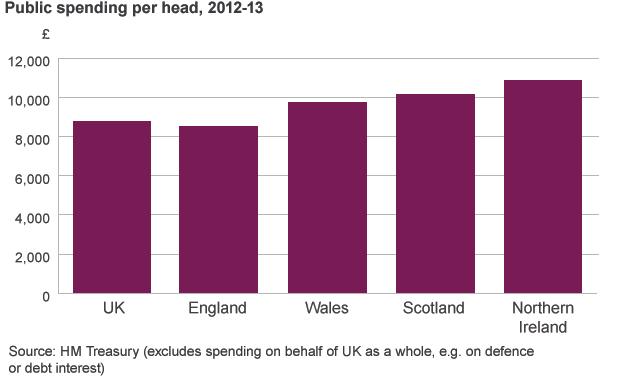Barnett formula 'flaw' means NI avoids £200m of spending cuts
- Published

Northern Ireland has avoided spending cuts of £200m due to a "flaw" in a formula that determines how much money it gets from Westminster, according to a new report.
The research by the Institute for Fiscal Studies (IFS) examined the Barnett formula, external.
It also sets public spending in Scotland and Wales.
It found how it dealt with business rates benefited Scotland and NI to the disadvantage of England and Wales.
The rates are fully devolved to the administrations in Holyrood and Stormont.
But in England the formula treats them as a contribution towards the Department for Communities and Local Government's (DCLG) budget for local authorities.
In fact, the level of this budget is not affected by revenues from English business rates, which have been increasing at a time when DCLG has suffered deep cuts.
Because other devolved services such as the NHS and schools have been protected, this anomaly has resulted in block grants to Scotland and Northern Ireland being cut by much less than the average reduction faced by departments serving England, said the IFS.
The report's author David Phillips, a senior research economist at the IFS, said the issue could be corrected by treating English business rates as part-funding all Whitehall departments that largely serve England.

Lord Barnett, who devised the formula for setting public spending in Scotland, Wales and Northern Ireland, died earlier this month, aged 91
Fixing the glitch in the formula would mean that devolved administrations' revenues more accurately reflect the decisions they make on tax, he said.
"The Barnett formula looks set to remain in place for some years to come. This appears to rule out a move to a needs-based formula," said Mr Phillips.
"But it makes it more important than ever to examine the Barnett formula to see if it is working in the way intended, and if flaws are found, to fix them.
"Problems with the way the Barnett formula treats business rates mean that Scotland and Northern Ireland have avoided hundreds of millions of pounds of cuts that they would have faced under a corrected formula - cuts that England and Wales have faced."
The Treasury insisted that the Barnett formula produces results that are "broadly fair, transparent and consistent" and said the IFS report concentrated on short-term results in one area of spending.
- Published3 November 2014

- Published30 October 2014

- Published27 October 2014
